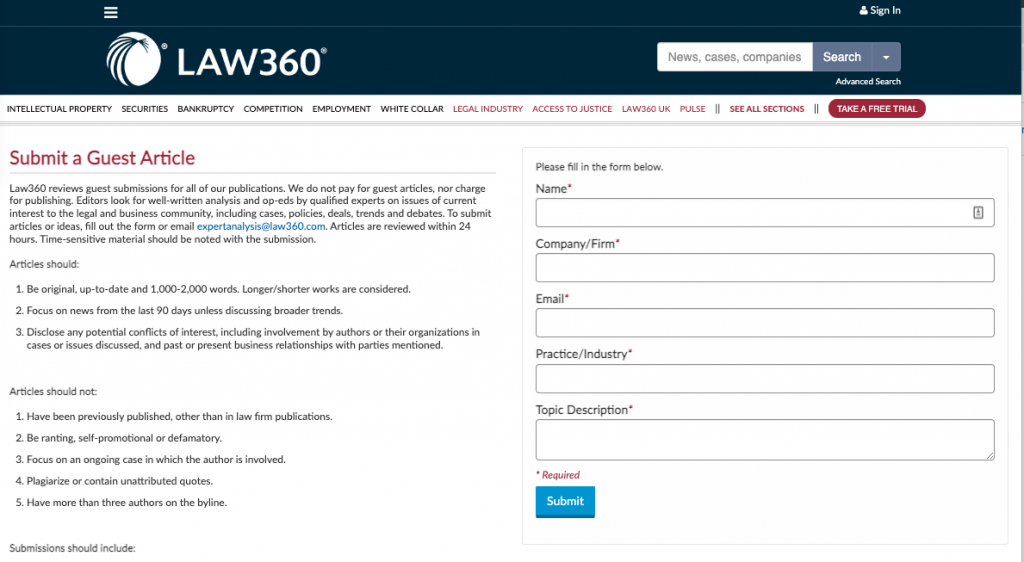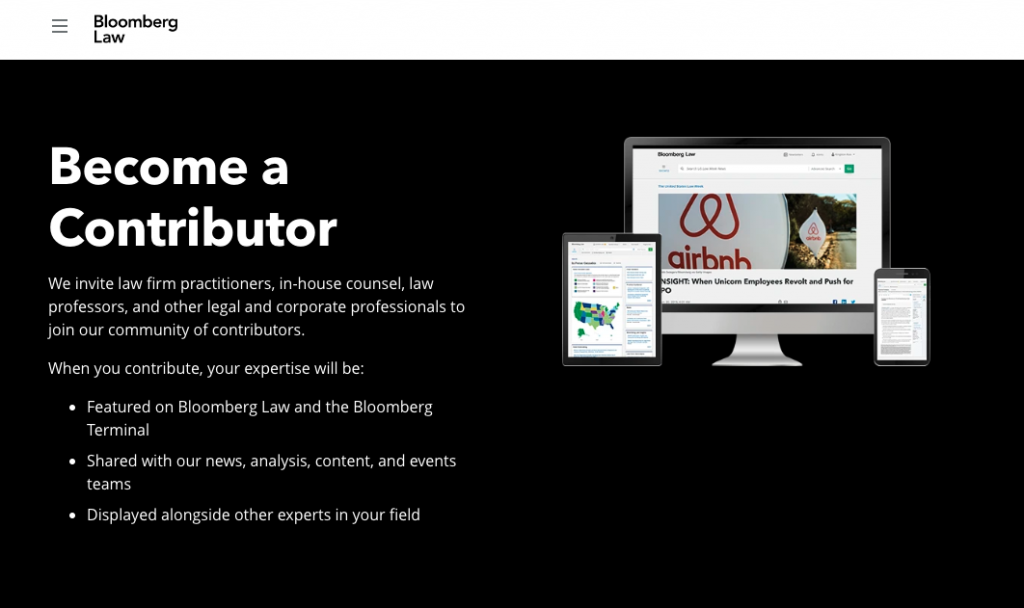Contributor networks and bylined article opportunities: What lawyers and legal professionals need to know
There are many ways to secure a byline in a key media outlet. While working with a legal PR agency is a surefire method to get in front of the right editors and reporters, it’s just one pathway to publication. Joining a contributor network can be an alternative way to break in — and your PR agency can help with that too.
Think of a contributor network as a bullpen of subject-matter experts a publication relies on to provide one-time articles or ongoing columns. Outlets usually open their doors to contributor network writers to offer practical, boots-on-the-ground stories and opinion pieces that supplement their staff-written stories. Once accepted into a network, lawyers and professionals usually have broad discretion regarding what they can write about, so long as they meet the outlet’s editorial standards and publishing cadence requirements.
The benefits are two-fold for the publication and its contributor network members. Accepted and vetted contributor network participants have a guaranteed forum to share their insights in a reputable publication. For the lawyer or professional, contributor networks can serve as a prime marketing tool, opening the door to business networking opportunities both within and beyond the contributor network, additional media opportunities and even keynote speaker or breakout session panelist invitations.
On the other hand, outlets leverage contributed pieces to build upon their reputations as go-to sources for readers seeking an insider’s perspective on the issues that matter most to their readers. Since search engines rank websites with quality content higher, contributor networks play well into an outlet’s SEO and other content marketing strategies. Success also begets success; the more robust and engaged the publication’s contributor network is, the better positioned the outlet is to attract more professionals as subscribers.
There are great niche contributor network opportunities that lawyers and legal professionals can pursue. The application process for each network can vary: some require a formal application process, while others entail contacting an editor. Authors can even be paid for their contributions to some publications, although most don’t offer this perk. But joining a contributor network can be a great way to raise an attorney’s profile and enhance their credibility, provided they select the right network for their goals.
Considerations for exploring contributor network opportunities
The beauty of contributor networks is that once a lawyer or professional is vetted and accepted, they are usually free to write on topics that interest them and suit their needs, with practically guaranteed publication. However, not all contributor network opportunities are alike or confer important benefits such as “follow” backlinks for SEO, unlimited republication and more. Lawyers and legal professionals should do their due diligence before committing to a network, and should consider the following factors when researching them:
1. Budget
Some of the most high-profile contributor networks, such as Forbes Business Council and Chambers Expert Focus, are pay-to-play and often cost thousands per month or engagement period. Clients participating in these programs have attracted other contributor opportunities, media interviews, referrals and prospect inquiries.
Before applying to these types of networks, any lawyer or professional should consider their projected return on investment and whether the upside of joining outweighs the high entry fees. Many other contributor programs offer comparable benefits to pay-to-play networks without any financial barriers to entry. These networks also provide a deeper reach into the legal and legal tech niches. While we wouldn’t necessarily rule out joining a paid network, it’s worth researching and prioritizing the free, more niche-focused ones that can provide healthy reputational and business returns.
2. Website traffic
Writing an article — or series of articles — takes time away from billable tasks. Therefore, lawyers and professionals must ensure they’ve selected the right outlet for publishing their content. Posting on a site that attracts more eyeballs can raise the likelihood the content will generate important leads or networking opportunities. Sites like SimilarWeb or Ubersuggest offer free tools that analyze traffic numbers for specific websites.
3. Niche industry focus
While being accepted into a contributor network can be great for any lawyer or legal professional, the publication hosting it should still be a top-of-mind option for the types of clients and referral partners that lawyers want to target. For example, an M&A lawyer should focus on the business publications that venture capitalists and entrepreneurs often turn to. Intellectual property lawyers, by contrast, should consider trademark, copyright and patent-centered outlets or those that target researchers and innovators.
4. “Follow” backlinks
Netting high-SEO-value backlinks is one notable perk that drives many lawyers and legal professionals toward signing up for contributor opportunities. This on-page link — which can appear in an author’s bio or within article content — takes an article reader off the publication site and onto the page it links to (often the law firm’s site or attorney’s bio).
The algorithms of Google and other search engines consider backlinks when calculating how far up a search results page a website should appear. The algorithms also weigh the quality of these backlinks based on the popularity and reputation of the sites linking out. Whether those backlinks count toward a website’s SEO reputation depends on how the outlet tags its hyperlinks in its website code.
Outlets that use hyperlinks with “follow” links are the ones that will pass their SEO link juice along; the ones that use “no-follow” or “NoIndex” tags on their backlinks — which look no different to the naked eye on a web page — respectively request or mandate search engines to not acknowledge the link for SEO crawling purposes.
NoFollow, a Google Chrome extension, identifies these unwanted no-follow backlinks by highlighting them in a red rectangle. Chances are, if a lawyer or professional sees no-follow backlinks in another colleague’s article for the contributor network they’re applying for, the publication may treat any links to their website similarly.
5. Reprint policies
A thought leadership column with a well-known publication can be a boon for attracting potential clients and prospects. It can also generate marketing collateral and ancillary content for a lawyer’s firm website or social media pages. For that reason, it is important to understand the specific policies of a given contributor network, including whether they allow the use of their masthead, permit republication in another outlet, or even charge for reprints. (You can find a helpful INKsights post on reprint policies here.) Law360, for example, permits authors to share text-only PDFs without the masthead of their articles across their website and social media pages, and requires authors to wait 90 days before republishing with another outlet.
Opportunities lawyers and legal professionals should consider
Several good contributor networks actively seek lawyers and professionals to join their ranks. Here are some options that lawyers and legal professionals should consider for ongoing column opportunities.
1. LawNext
Professionals and attorneys searching for legal-tech-focused contributor networks should have LawNext at the top of their lists. Accepted contributors will collaborate directly with directory founder Bob Ambrogi, who ranks among the sector’s most-respected legal tech influencers. Although Ambrogi launched LawNext to be a comprehensive legal tech vendor and product directory, he wants it to evolve into an all-encompassing resource for consistent legal tech news and practical content.
Contributors in LawNext’s contributor network can propose one-off articles or ongoing columns, or ask Ambrogi to assign them topics. Based on the directory’s current needs, interested contributors should come prepared with content ideas involving product reviews, product comparisons, buyer guides, tips and tricks, how-to guides, best practices pieces, case studies and trend analyses.
2. Law360 Expert Analysis
Lawyers with something valuable to add to an emerging trend in the legal world should strongly consider submitting an article idea to Law360’s Expert Analysis team. As with many of the publications on this list, Law360 values expert analysis, and accepts topic ideas from lawyers across different practice specialties. While submitting to Law360 does not necessarily lead to an ongoing column, having multiple articles published on the site will also help build an attorney’s profile as a legal thought leader.
We debated whether Law360 can be defined as a contributor network, but decided to include the outlet on this list since attorneys can contact them directly with article ideas. Law360 is open to one-off assignments and possible ongoing contributions from lawyers and other legal community professionals. Learn more about the publication’s contributor requirements here.
Law360’s editors do edit each article they receive and are the outlet’s gatekeepers for deciding approved topics and whether to publish completed articles. Because Law360’s expert analysis team also takes pitches from PR agencies (we’ve successfully placed many guest columns ourselves), prospective authors will have some competition for editorial consideration. An experienced PR agency can offer lawyers and professionals guidance on topics to submit that would fit current legal trends and Law360’s focus topics, or even email the editors directly to guarantee a stronger chance of securing commitments.
3. Benzinga
A great choice for members who work in corporate transactional work and litigation, Benzinga covers news relevant to Wall Street and the business community. Stories exclusive to Benzinga are syndicated to huge audiences across the web, including MSN Money, Forbes, DailyFinance, Marketwatch, Windows 8 and TD Ameritrade — giving lawyers and professionals a good return for their time. As Benzinga is an elite financial media outlet, having an affiliation with the site will immediately put any author on the map with the finance community.
Benzinga considers contributors who apply directly from their website. Authors unsure of whether their stories will be appropriate for Benzinga can contact the outlet’s editorial team for immediate feedback.
4. Bloomberg Law Contributor Network
Like Law360, Bloomberg Law welcomes law firm lawyers, in-house counsel, law professors, and other practicing attorneys to join its community of contributors. There is no fee to apply, and selected contributors can have their thought leadership on the Bloomberg Law website and Bloomberg Terminal, Wall Street’s go-to financial data platform.
Contributors selected for Bloomberg Law’s contributor network will share their pieces with the top minds in the legal, business and regulatory communities. All contributed articles from selected lawyers and legal professionals are featured outside Bloomberg Law’s paywalls in the publication’s professional perspectives and insights sections. Interested lawyers, professionals and professors must email the Bloomberg Industry team directly with ideas.
5. Washington Post Talent Network
The Washington Post Talent Network invites working professionals and full-time freelancers to enter into WaPo’s contributor database. Entrants must register through the WaPo’s portal, and provide their work history, a brief bio, headshot, and selections from a predetermined list of preferred writing topics. Law, of course, is one of them.
Securing a WaPo assignment can involve a waiting game, and tends to favor highly experienced or credentialed applicants offering a unique perspective on specific issues. But once a lawyer is in the fold and has a good working relationship with WaPo editors, being called a WaPo contributor can be a nice credential to add to their thought leadership arsenal. Working lawyers or legal professionals should select “part-time freelancer, full-time professional” as their job status when completing the application to be considered for future assignments.
6. National Law Review (NLR)
Another highly trafficked resource that lawyers and professionals can consider contributing to is the National Law Review (NLR). This searchable online database of business and legal content serves legal analysis to more than 130,000 subscribers and 2.5 million monthly visitors, many of whom are lawyers, accountants, business executives and other professionals. Although the NLR requires lawyers and professionals to pay for placement if they work at a for-profit entity or law firm, it offers free guest publishing options for contributors who work for non-profits.
The NLR is interested in sharing white papers, law firm newsletter articles, client alerts, podcasts, videos and other timely and helpful content focused on key legal and business developments. The resource spotlights each new piece in its “Most Recent Contributors” section on the outlet’s home page, and remains searchable in NLR for at least two years. Another perk of working with the NLR is that authors receive dedicated author bios and backlinks, which can help with their SEO plans.
Contributor networks can provide an excellent gateway for lawyers and legal professionals to get started with their thought leadership initiatives and test the waters before leveling up to a more sophisticated PR marketing plan. With some hustle, research and consistent work at the keyboard, a lawyer or professional can leverage their column opportunities to attract clients and develop a robust and loyal following.















